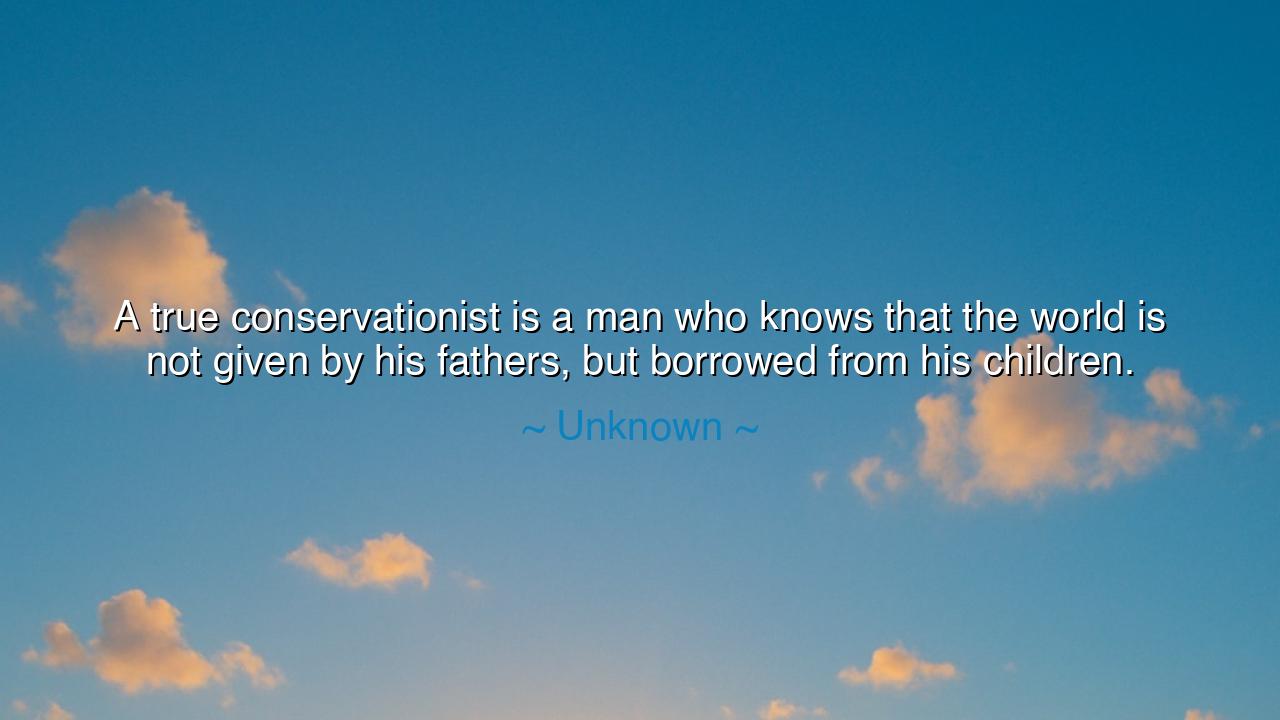
A true conservationist is a man who knows that the world is not
A true conservationist is a man who knows that the world is not given by his fathers, but borrowed from his children.






In the timeless and haunting words of an unknown sage, we are given a truth that echoes through every age: “A true conservationist is a man who knows that the world is not given by his fathers, but borrowed from his children.” Though the name of its author is lost to time, the spirit of this quote burns with the wisdom of the ancients. It speaks of responsibility, of stewardship, and of the sacred bond that links all generations—past, present, and future. In these few words lies the reminder that the earth, with all its forests, rivers, and skies, does not belong to us to exploit, but to guard. It is not an inheritance to consume, but a trust to preserve.
To understand this saying is to understand the cycle of life itself. The world—this fragile sphere of light adrift in the vast darkness of space—is not ours by right. It is a gift entrusted to us by those who came before, and a loan we hold for those who will come after. A true conservationist, therefore, is not merely a lover of nature; he is a guardian of time. He acts not for himself, but for the generations yet unborn, those silent souls whose eyes will one day gaze upon the same sun and stars that shine upon us now. To live with such awareness is to live with reverence—to plant trees whose shade you will never rest beneath, to protect rivers whose waters you may never drink.
This wisdom has ancient roots. The Native American peoples, long before the modern world spoke of “environmentalism,” lived by a teaching known as the Seventh Generation Principle—that every decision made should consider its impact on the next seven generations. They understood what this unknown author proclaimed: that to live wisely, one must think beyond one’s own lifetime. The earth, to them, was not property but kin—a living being whose well-being determined their own. When they hunted, they gave thanks; when they harvested, they replenished. They lived as though their children’s children were already watching them. Such was their conservation, not of law, but of love.
History, too, offers us warnings of what happens when this wisdom is forgotten. Consider the tale of the Dust Bowl in America during the 1930s, when years of careless farming stripped the land of its strength. The fertile soil, once dark and rich, was blown into the sky, darkening the day and suffocating life. Families fled their homes; crops withered; entire regions became wastelands. The people had acted as though the earth were endless, as though the bounty of nature could never run dry. But nature, ever just, reminded them that exploitation brings ruin, while stewardship brings renewal. This tragedy, born from short-sightedness, became a lesson carved into history: that to take without giving back is to steal not from the earth, but from our own descendants.
Yet the heart of this quote does not dwell only in warning—it calls us to hopeful action. It reminds us that every person, no matter how small their circle of life may seem, carries the power to shape the inheritance of tomorrow. To conserve is not merely to preserve forests or oceans; it is to live with mindfulness—to waste less, to care more, to honor the delicate balance of creation. The true conservationist is one who plants seeds, both literal and spiritual, knowing that though he may never see them bloom, others will. He understands that the measure of his life is not in what he consumes, but in what he leaves behind.
Even in the modern world, this truth has found champions. When Wangari Maathai, the Kenyan environmentalist, began the Green Belt Movement, she faced scorn and resistance. Yet she planted trees—millions of them—believing that each sapling was a promise to the future. “We are called to assist the earth to heal her wounds,” she said, and in doing so, she became a living embodiment of this ancient wisdom. Her work restored not just forests, but dignity and hope to her people. Like the unknown author of this quote, she understood that to protect the earth is to love humanity itself, across the bridge of generations.
So, O listener and heir to the earth, take these words to heart: you are not an owner of this world, but a borrower. Treat the soil beneath your feet and the air above your head as sacred trusts. Walk gently upon the land. Waste nothing that can be renewed. Give back more than you take. Teach your children gratitude for the sunlight, for the rain, for the quiet pulse of the living world. For when we live with this awareness, we become not destroyers, but keepers of life—the guardians our children will one day bless.
And thus, let this truth echo in your soul: “The world is not given by our fathers, but borrowed from our children.” Live by it, and you will join the great chain of those who came before and those yet to come—the eternal guardians of creation, who understand that the true measure of a life is not what it gathers, but what it preserves. To conserve is to love, and to love is to endure.






AAdministratorAdministrator
Welcome, honored guests. Please leave a comment, we will respond soon